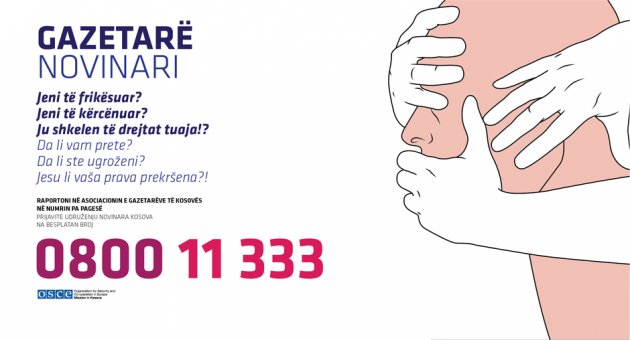Kosovo: Advice line could help protect the rights of journalists

Journalists in Kosovo experiencing harassment or receiving threats can call a new 24/7 helpline for support and advice. Launched in October by the Association of Professional Journalists of Kosovo (AGPK) and the OSCE Kosovo Mission, the phone line is accompanied by an awareness campaign urging journalists to report all cases of intimidation and violence.
Journalist Zekirja Shabani, head of the AGPK, says he would have greatly benefitted from such a helpline when he was set upon by his boss back in December 2014. The owner of the Pristina-based daily Tribuna physically assaulted him after Shabani said he would sue the paper for failing to pay its staff in time.
“As a reward I was attacked and fired from the job,” Shabani told Index on Censorship.
Though Shabani immediately reported the attack to the police, he says there was no followup. Still, it was worth it, Shabani concludes. “It was a good signal for other journalists to raise their voice and fight for their rights.”
Attacks, intimidation and pressure on journalists are common in Kosovo. According to the AGPK, the number of threats and attacks increased from 15 in 2013 to 27 in 2014. “This is a sign that journalists are working in a dangerous environment,” says Shabani. “And a lot of them are not reporting the threats for different reasons.”
The phone line could help break the silence and make it easier for journalists to talk about violence and intimidation, Shabani believes. “There’s a real need for all journalists to have a chance to raise their voice and speak out about their problems in full confidentially.”
The phone is manned by members of the AGPK only. “We don’t have the capacity to hire anyone else,” Shabani explains. Each staff member mans the mobile phone, which they take home overnight, on one-week rotations.
During the first week that Shabani was in charge of the phone, he received two phone calls. “Clearly there is still a need to increase awareness and let journalists know that someone is taking care of them,” he says.
Journalists calling the helpline will be advised and directed towards institutions which can further help them, such as the police or a lawyer. The AGPK has a law firm on stand-by 24/7.
Meanwhile, the organisation will also collect all the data from calls to get a clearer picture of the status of media freedom in Kosovo. Index on Censorship’s Mapping Media Freedom project has reported 15 violations in the country since May 2014. The AGPK has reported 27 incidents in 2014 alone. Human Rights Watch found 22 cases of physical violence and threats in the period between January and November 2014.
These statistics are just the tip of the iceberg as so few journalists report incidents to the police.
The type of media freedom violations in Kosovo vary, from pressure from employers to threats for reporting on radical religious groups or government corruption. In September last year, a journalist with the Indeksonline news portal received threats on multiple occasions for reports on radical Islamic groups operating in Kosovo. Earlier this year a journalist for Radio Kosova was threatened and censored while investigating false war veteran lists in the country.
The helpline could make it easier for journalists like these to report their cases, Shabani hopes.
The helpline also documents violations of workers’ rights. “We already know that a huge number of journalists are working without contracts, not being paid on time and in bad working conditions,” says Shabani. “The helpline could help the fight for better rights for journalists in general.”
The free helpline for reporting threats against journalists is 0800 11 333.
Mapping Media Freedom
|
